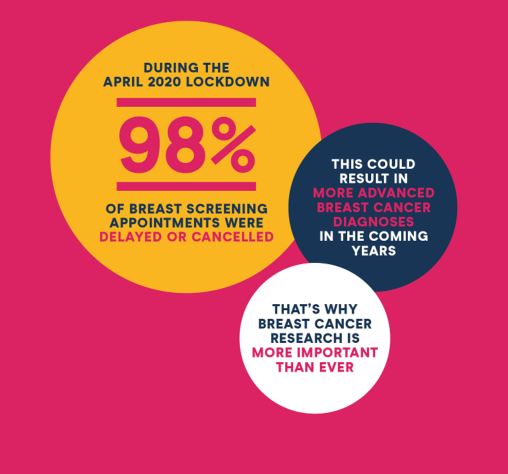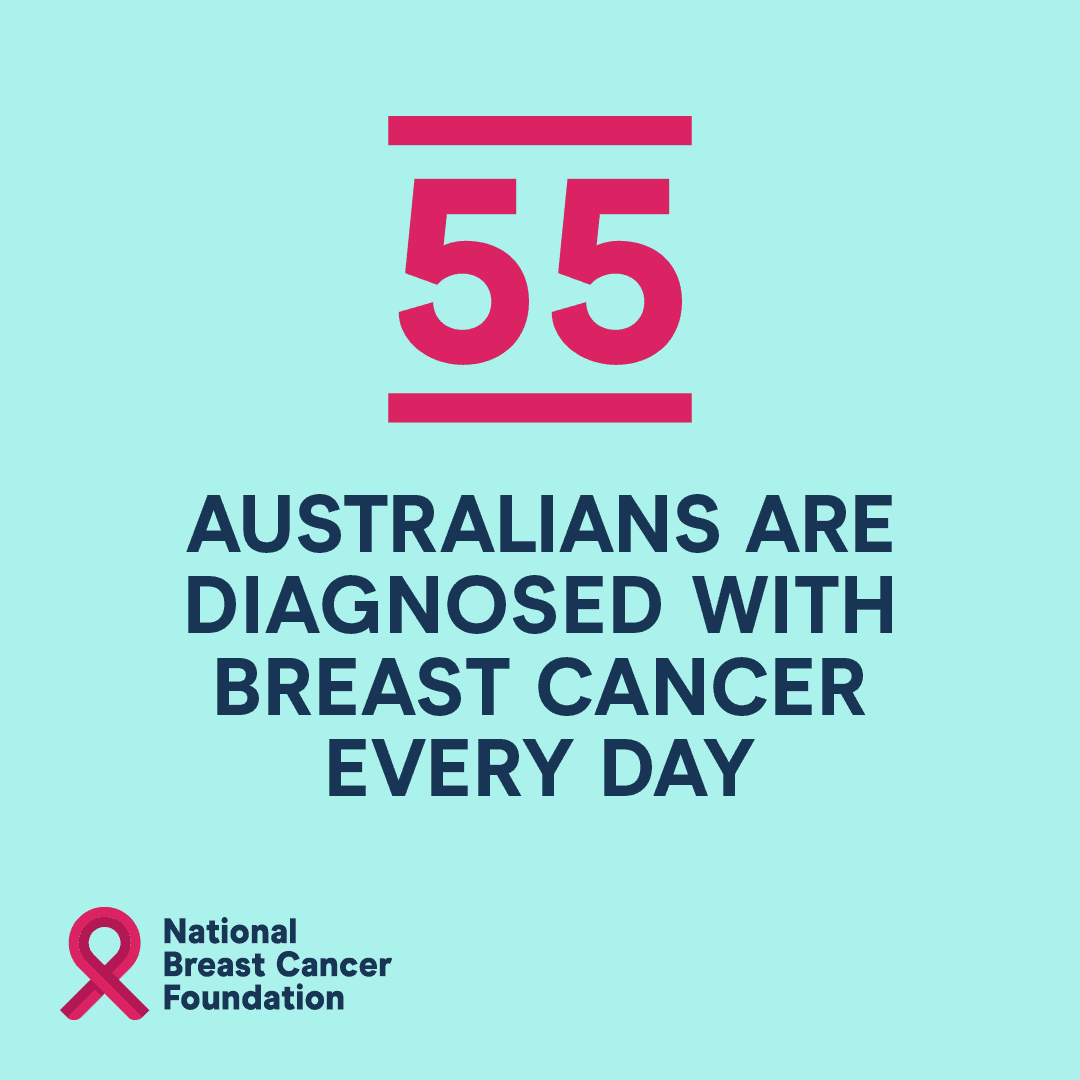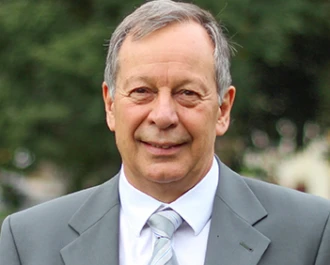
The National Breast Cancer Foundation (NBCF) has marked the start of Breast Cancer Awareness Month by calling for increased funding into more advanced breast cancers, publishing an update on COVID-19’s impact on the disease which forewarns the potential increase in more advanced diagnoses in the coming years.
This comes as the pandemic has seen a drop in breast screening, breast care appointments and surgeries, with rescheduled appointments and the closure of BreastScreen facilities resulting in roughly 98 per cent of breast screens cancelled or delayed across Australia in April 2020, while diagnostic and investigational surgeries dropped by up to a third in the first wave of COVID-19 alone.
While it is not yet known what impact the Delta strain will have, NBCF expect detection rates of more advanced breast cancers and mortality rates to rise in the coming years. Recent data estimates up to 3,000 cancer diagnoses have been delayed since the start of the pandemic in Victoria, with many of those predicted to be breast cancer, while surgical delays of just 12-weeks could result in 500 more breast cancer deaths each year.
READ NBCF’S IMPACT OF COVID-19 REPORT
In addition, it is estimated that there may have been between 10,000 and 20,000 cases of cancer that have been missed during the pandemic. With breast cancer being the most commonly diagnosed cancer in Australia, NBCF is concerned that many of these 10-20K cases are likely to be those who have undiagnosed breast cancers.
In 2020, there were 20,000 fewer breast screening procedures than what would have been expected in a normal year. There were 1000 fewer breast cancer-related surgeries (eg excision of breast lesions and mastectomies).
Further, current data shows that later detection results in lower five-year survival outcomes, with a 100 per cent survival rate attributed to stage 1 diagnosis, dropping to 94.6 per cent for stage 2, 80.2 per cent for stage 3 and just 32 per cent for stage 4 (metastatic) breast cancer.
While research has seen positive progress in the rise of the overall five-year breast cancer survival rate from 76 per cent in 1994 to 91.5 per cent this year, this update is a reminder that further investment is needed for research tackling hard-to-treat breast cancers to improve survival outcomes for the women yet to develop or be diagnosed with these types of the disease.
With the pandemic also creating significant challenges for breast cancer researchers, NBCF has played an essential role in providing ongoing funding for life-saving research, but says they will require at least $150 million over the next 10 years to continue its progress towards zero breast cancer deaths.
NBCF-funded researcher Professor Sherene Loi (Peter MacCallum Cancer Centre and University of Melbourne) says that NBCF-funding has supported her projects aimed at improving survival rates for women diagnosed with breast cancer, with projects focused on immunotherapy, triple-negative breast cancer and HER-2 positive breast cancer.

NBCF-funded Endowed Chair Professor Sherene Loi
“The National Breast Cancer Foundation fund a significant amount of my research, from immunotherapy for breast cancer detected early, to developing new treatments for late-stage and triple-negative breast cancer.
“One of my current projects is focused on developing a new antibody-drug conjugate for targeted therapy for triple negative and HER2 positive breast cancers, where higher doses of medication can be administered without many of the nasty side-effects of standard chemotherapy. I believe that this new therapy could be combined with immunotherapy to greatly improve outcomes.
“This could mean women diagnosed with later-stage or hard-to-treat breast cancer will have treatment available that can increase survival outcomes with more effective and targeted treatment, while improving quality of life during treatment.”
As breast cancer incidence is increasing across all age groups and has continued to outpace population growth in Australia, this type of research is critical to develop new and more effective treatments for women yet to be diagnosed with more advanced breast cancer.
NBCF CEO Professor Sarah Hosking says that this breast cancer awareness month is a timely reminder of the need for ongoing investment into breast cancer research in the wake of COVID-19 and the expected increase in diagnoses and breast cancer deaths.
“Breast Cancer Awareness Month has historically shone a spotlight on increasing awareness of breast cancer and its impacts on the 230,000 Australian women and men who currently live with the condition.
“This year, we must look at the significant impact of COVID-19 and delays in detection in our vision for Zero Deaths from breast cancer, as we know that time is a key factor in determining treatment options and survival outcomes.
“With the expected increase in hard-to-treat breast cancer diagnoses in years to come, the time is now to re-focus on accomplishing zero breast cancer deaths and the additional funding required to reach that goal.
“Breast cancer will not wait for COVID-19 to end.”
Breast cancer is the most commonly diagnosed cancer in Australia, with approximately 55 Australians diagnosed each day. Its incidence has increased by 36 per cent in the last 10 years and in 2021, it is predicated that 9 Australians will die each day from the disease.
NBCF has been committed to funding life-saving breast cancer research since 1994, and data shows that without continued investment in research, over 30,000 lives will be lost to breast cancer by 2030.
Want to get involved this National Breast Cancer Awareness Month and raise funds for vital research to help end deaths from breast cancer? Donate here
Reference List:
Australian Institute of Health and Welfare, Cancer screening and COVID-19 in Australia December 2020
Cancer Australia, National and jurisdictional data on the impact of COVID-19 on medical services and procedures in Australia: Breast, colorectal, lung, prostate and skin cancers, December 2020.
Victorian Covid-19 Cancer Network (2020). Cancer and COVID-19: delayed cancer diagnoses and the impact on primary care. Available online.
Radiation Therapy Advisory Group, COVID’s impact on breast cancer in Australia, August 2021
Australian Institute of Health and Welfare, Cancer Data in Australia June 2021
Australia’s population sourced from Australian Bureau of Statistics. Breast cancer new cases sources from Australian Institute of Health and Welfare. Cancer Data in Australia 8 June 2021
More News Articles
View all News




